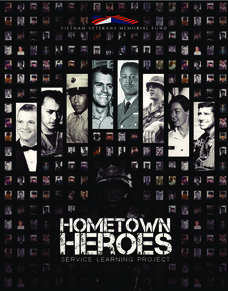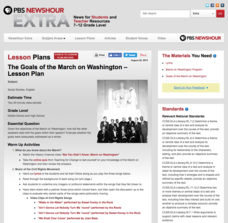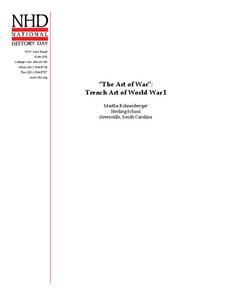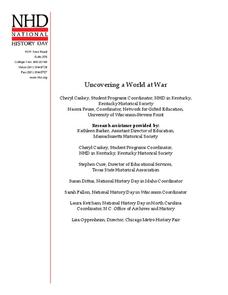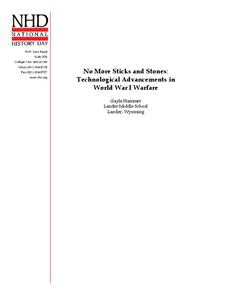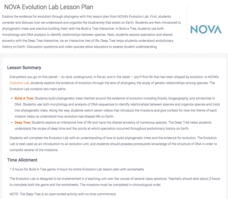Vietnam Veterans Memorial Fund
Hometown Heroes
Transform studying about veterans in a textbook to personal interviews with veterans in the community. Four varying lesson plans make up an entire unit or individualized learning based on your class's needs. Exercises include researching...
PBS
NOVA RNA Lab Lesson Plan
Scholars learn the differences between RNA and DNA through discussion, virtual labs, worksheets, and video quizzes. They build their knowledge of molecular biology with support from video clips and handouts.
Center for Civic Education
The Power of Nonviolence: Rosa Parks: A Quest for Equal Protection Under the Law
Teach young historians about the historical legacy of Rosa Parks with a multi-faceted lesson plan. Pupils follow stations and use journals to explore prominent events, analyze primary resource documents, and engage in interesting...
Montana State University
Ice in Action
Make your own bite-size glacier! A resource teaches about the formation and melting of ice. Activities include videos, a hands-on activity where your pupils build glaciers, and a photographic analysis to teach individuals the chilling...
Montana State University
Sea Floor to Summit
Who knew that mountain formation could be so entertaining? Leanr how mountains form with a resource on Mount Everest. Activities to guide learning include a simulation, project, videos, coloring activities, and worksheets.
Montana State University
What's the Weather?
How many jackets do you need to stay warm and climb Mount Everest? An informatie resource covers the topic of Mount Everest, the resource helps young scientists discover the difference between climate and weather. Activities include...
PBS
Women's History: Parading Through History
Want to teach your pupils about debate, effective speech techniques, propaganda, and the women's movement? The first in a sequential series of three, scholars analyze real propaganda images from the the historic women's movement, view a...
PBS
The Goals of the March on Washington
Who else had a dream other than Martin Luther King, Jr.? Pupils explore civil rights leaders in a fourth lesson out of a series of five about people who paved the way to freedom for African Americans. The inquiry-based unit has your...
National History Day
Helping Life and Aiding Death: Science, Technology, and Engineering at Work during World War I
Science, engineering, and United States history? Pupils research collections of artifacts from the Smithsonian to learn about historical scientific innovations. At the end of the lesson, they write an essay to discuss technology's...
National History Day
Heroes Who Made a Difference: Memorializing a Distinguished Service Cross Award Recipient
Ever wonder how to memorialize World War I heroes in the classroom? Activities in a high-quality social studies resource prompt middle schoolers to research Internet sources, complete a graphic organizer, and write an editorial feature...
National History Day
More Than Mud and Cooties: The Poetry of World War I Soldiers
Poetry is not just for romance. Teach middle schoolers about soldiers' experiences during World War I with poetry written by the soldiers themselves. The lesson includes a simulation activity, a graphic organizer activity, and a...
National History Day
“War Is Hell. We Know it Now.” American Soldiers in the Meuse-Argonne Offensive
Understanding the soldier's experiences during World War I sometimes takes a newscast. Learners see the importance of understanding multiple points of view with a newscast project surrounding the Meuse-Argonne Offensive. Compare and...
National History Day
“The Art of War”: Trench Art of World War I
Teach pupils how veterans used art to deal with PTSD and shell-shock from trench warfare during World War I. Scholars use graphic organizers, a cartoon analysis sheet, and their own inferences to analyze primary source art work by veterans.
PBS
NOVA Sun Lab Lesson Plan
Looking for a sun-sational multi-lesson plan full of videos, simulations, and discussion? Introduce your young scientists to all things solar with a four-part hands-on adventure. Pupils learn the basics of solar anatomy, space weather,...
US Institute of Peace
Identifying Conflict Styles
Are you a peace-keeper or a problem-solver? Explore conflict management styles through a instructional activity, fourth in a 15-part series, that combines individual assessment and collaborative work. Groups learn the basic tendencies of...
Roald Dahl
The Twits - The Monkeys Escape
Houses come in all shapes and sizes, but not all houses are safe from Mr. and Mrs. Twit. The 10th lesson in a unit designed to accompany The Twits by Roald Dahl turns learners into architects. While designing houses for the monkeys, they...
Roald Dahl
The Twits - The Furniture Goes Up
Work gets done faster when people work as a team. The ninth installment of an 11-activity unit designed to accompany The Twits by Roald Dahl combines character education with research skills and creative writing activities. The activity...
National History Day
Uncovering a World at War
Has media always had an influence on public policy? After researching and reading news articles written during World War I, learners understand the influence of communication and media. They discuss articles in small groups and as a...
National History Day
No More Sticks and Stones: Technological Advancements in World War I Warfare
Remind young historians that many technological advancements influenced the events of World War I. After analyzing technology's evolution through primary sources, discussing the changes over time, and watching various video clips,...
National History Day
World War I Propaganda: Targeting all Americans to Join the War Effort
Is propaganda from World War I any different than the propaganda of today? Class members learn about the effectiveness of advertising and its influence on American's behavior. Activities include a propaganda think sheet, assessments of...
National History Day
“Saving the Bear”: The Russian Expeditionary Force of World War One
How have Russian politics affected countries on a global stage? The discussion of the Russian Revolution and World War I begins with an analysis of primary resource letters. Learners finish with a project where they create a timeline of...
National Endowment for the Humanities
People and Places in the North and South
North and South: two opposite directions and two opposite economic and social systems in time of the Civil War. Pupils peruse census websites and primary source photographs to understand what life was like for the everyday person before...
PBS
NOVA Evolution Lab Lesson Plan
It doesn't matter if you look on land, in the air, underground, or in water—evolution is everywhere. Scholars complete worksheets with multiple question types as they progress through six online missions creating phylogenic trees.
Science 4 Inquiry
States and Phases of Matter
Plasma is the most common phase of matter in our universe. Scholars explore the change of energy as molecules change phases of matter. They rotate through stations, graphing the changes in energy level.


